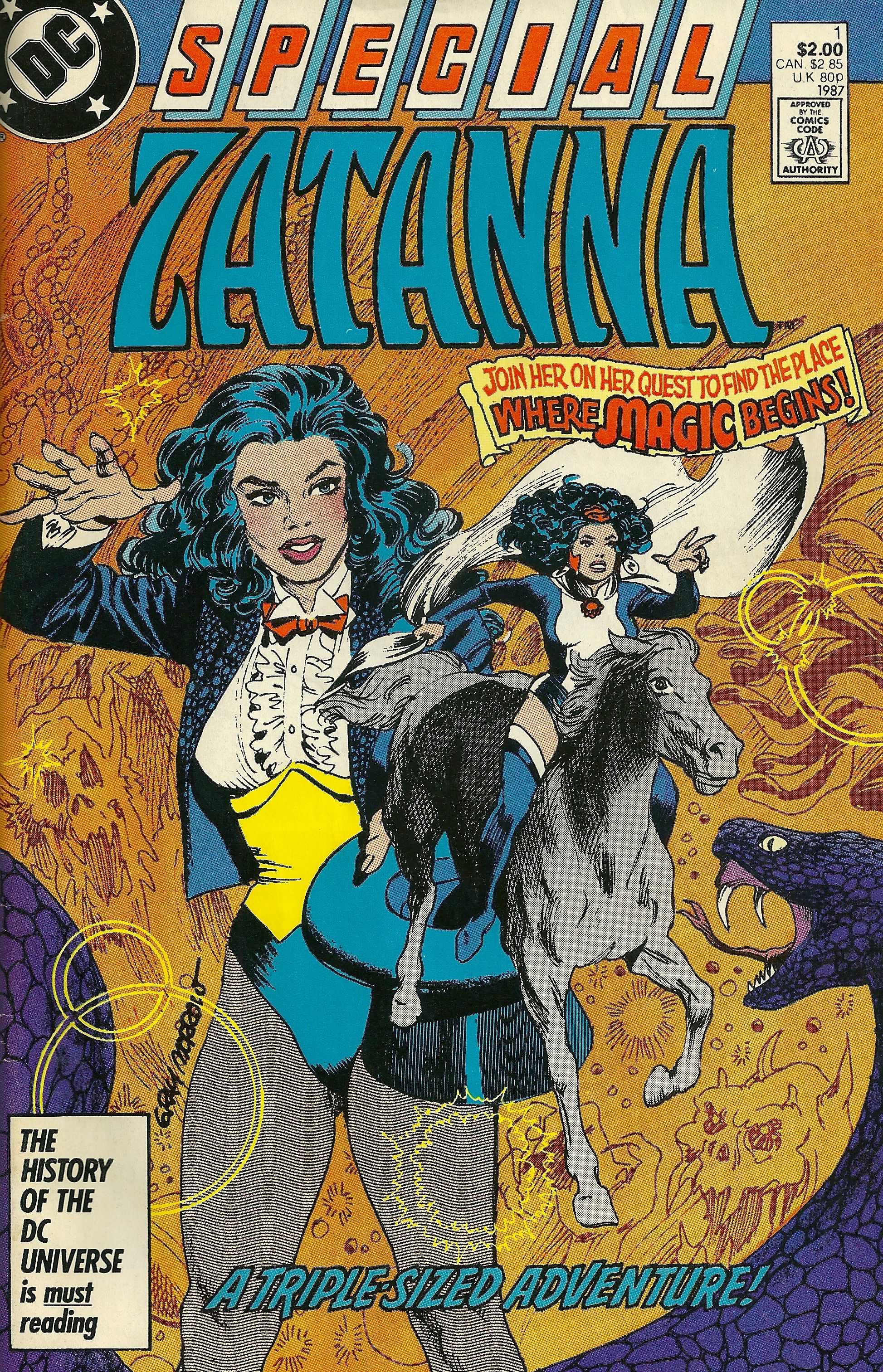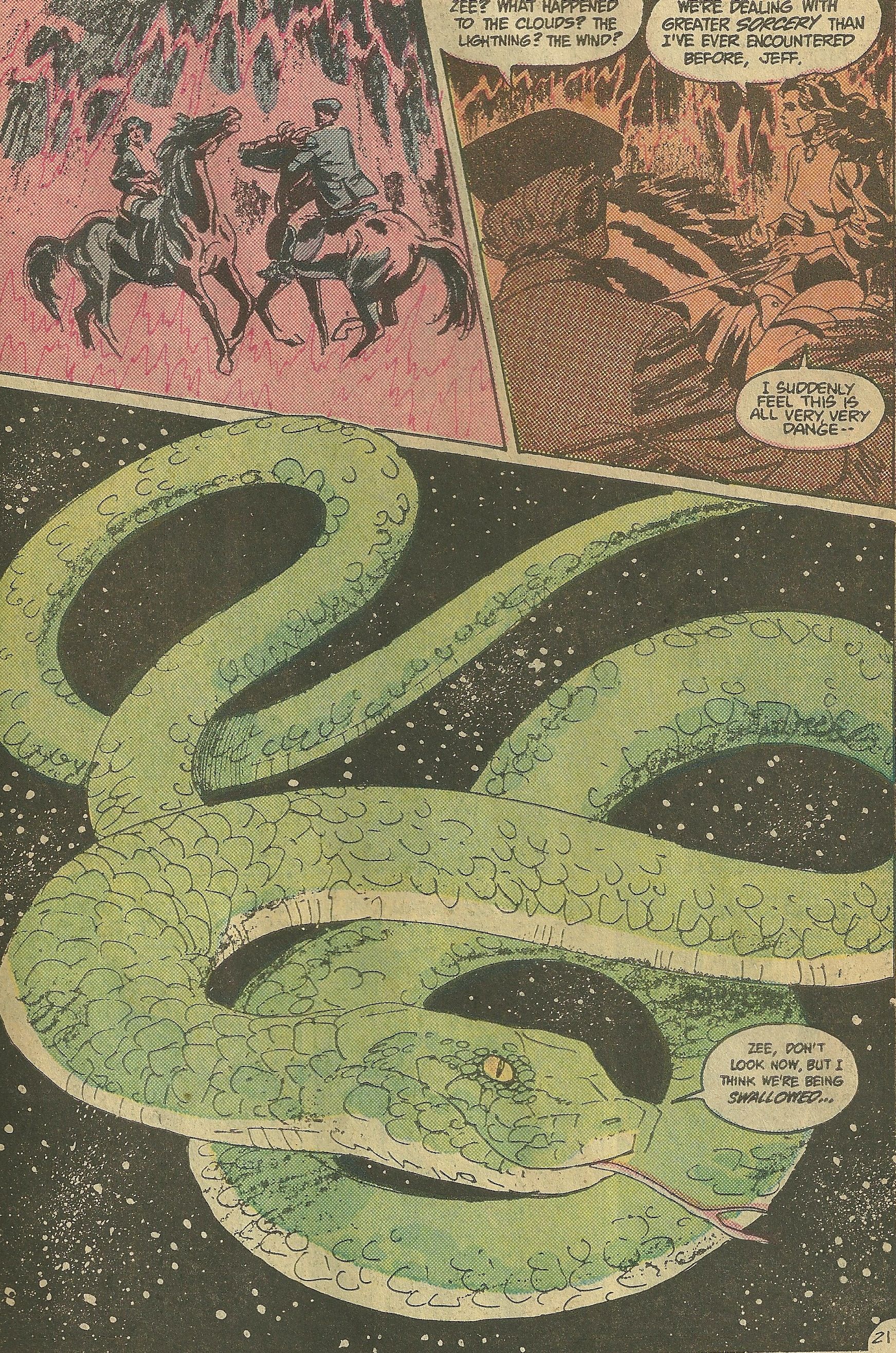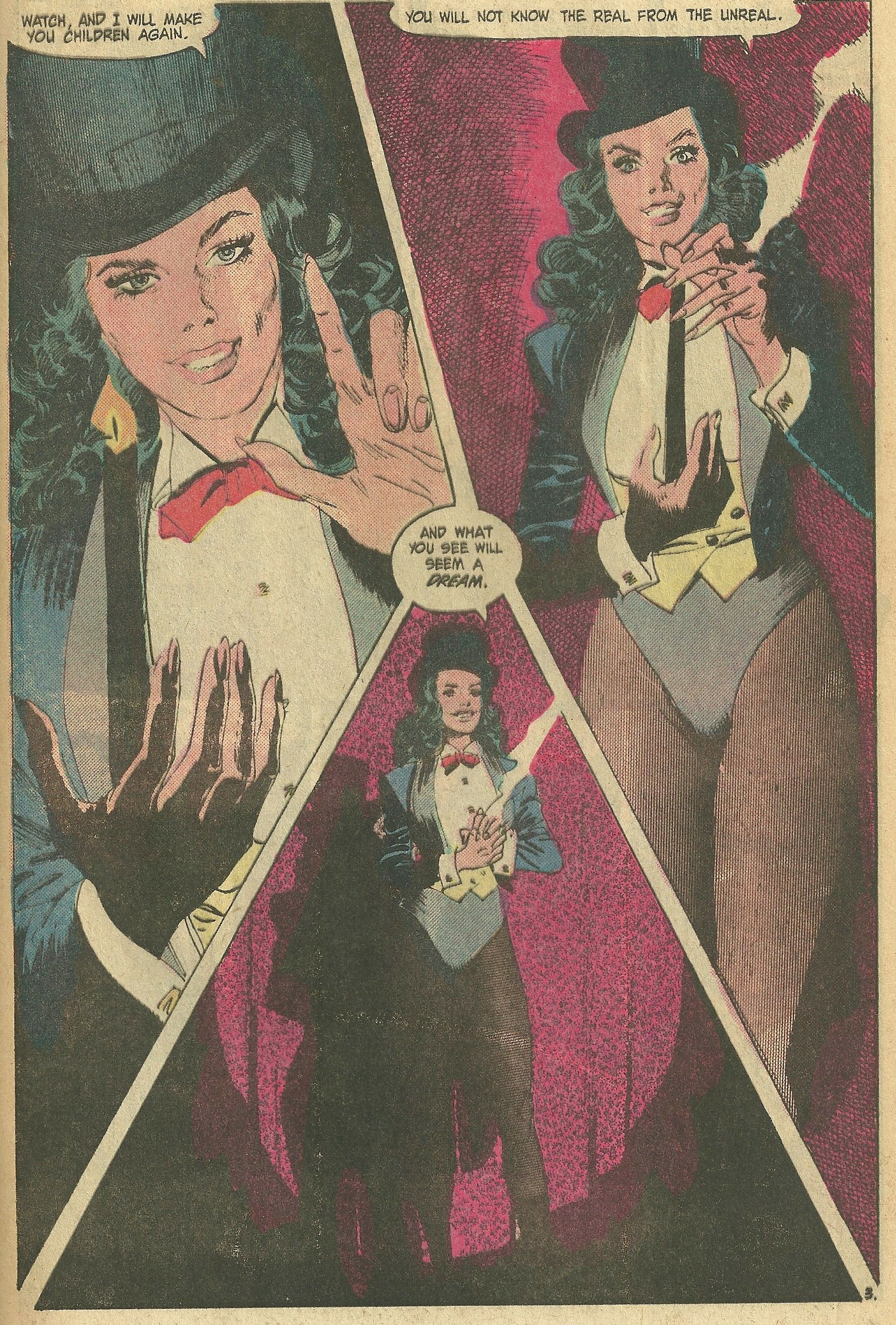A column in which Matt Derman (Comics Matter) reads & reviews comics from 1987, because that's the year he was born.
Zatanna Special #1 by Gerry Conway (not credited), Gray Morrow, Ben Oda, Carrie Spiegle, John Costanza
I was very excited to dig into this comic, because Zatanna is an awesome and often underused character, and the special is 64 pages, meaning I was in for a triple-sized treat of backwards magic greatness. Unfortunately, 64 pages ended up being far, far too few for the narrative told here, so instead of a dense punch of Zatanna awesome, I got a poorly-aimed slap. That's not to discredit the book entirely, because there are some juicy ideas and lots of excellent artwork, but there's also a jumbled rush to the pacing from top to bottom that greatly lessens the effects of any enjoyable bits.
Perhaps the problems with the writing are related in some way to the fact that the writer is uncredited. A 5-second Internet search will tell you it's Gerry Conway, but I don't know the details of why his name isn't included in the actual comic. Whether it was his choice or an editorial one, somebody must have been unhappy with something, and it makes me wonder how much of the script even was Conway's in the end. Whoever wrote or co-wrote it, it's got enough raw material to fill a year or more of a well-paced Zatanna ongoing, but instead it gets cramped into this one oversized issue, overloading the reader with so much info and adventure that I'm still a little fuzzy on the details.
Things kick off with Zatanna being attacked by a surprise magical snake in the middle of her performance as a stage magician. This and a handful of other sudden supernatural events lead Zatanna to believe her dead mother, Sindella, is trying to reach out to her somehow. So Zatanna, after like half a page of uncertainty, decides to answer that call by traveling to the secret land of her mother's people, the Homo Magi, an isolated race of humans born with magical powers. Accompanying Zatanna on this journey is Jeffrey Sloane, her manager who is also in love with her. Sloane comes along somewhat reluctantly, more for moral support than anything else, since he is completely out of his depth dealing with forces of magic. He is the wisecracking sidekick to Zatanna's serious, focused hero, which could make them a fun and interesting pair, if there were a bit more nuance to their dynamic. The trouble is, Sloane almost immediatley becomes a two-note character; he's either complaining half-sarcastically about the dangers of his and Zatanna's quest, or he's whining internally about how he loves her but they're not together. He never contributes much to the actual story as far as moving it forward is concerned, and though at the end his connection with Zatanna is said to be what saves her, we don't actually see how that works so it feels like an unearned conclusion.
Zatanna and Sloane make it to the land of the Homo Magi, only to find everyone there under the effects of an evil spell that is slowly killing them. In an awkward info dump, the leader of the Homo Magi (the High Lord) tells Zatanna exactly what steps must be taken to break the spell, which she follows easily, rescuing her mother's people from their strange magical ailment with minimal effort. This plotline now neatly wrapped up, the comic leaps into the partially related but brand new story of Zatanna trying to decide whether to stay with the Homo Magi or return to her own life. The key to answering that question is also conveniently handed to her by the High Lord, and she and Sloane head off on another trip to complete another assigned task. This then becomes the pattern of this entire comic: a fresh problem is introduced out of nowhere, Zatanna quickly solves it, and the whole thing repeats. The problems grow less detailed and her solutions get hazier and hazier until, in the end, she tackles her greatest challenge (defeating her father's old nemesis Allura) off-panel, merely telling Sloane it happened without the reader getting a chance to see how. The script never pauses to reflect on the consequences or aftermath of what has just occurred, nor does it give many details on what is to come. Things just happen, each event rolling right into the next no matter how disorienting or confusing that may be.
This breakneck speed does mean that there's time for a ton of interesting concepts or narrative threads to be teased along the way, but nothing gets the proper attention of exploration it deserves. Zatanna and Jeff are swallowed whole by an enormous magical space snake, which is fantastic, but they escape too quickly and easily, without the creature itself being explained in any way. Where did it come from, where is it going, and why does it exist? Is it sentient? Are there other huge reptiles in space? Why does being inside of it seem to boost Zatanna's powers? None of this is even asked, let alone answered, before the snake is taken off the board, never to be seen again, and the story moves on to its next cool idea. This is just one of the earlier and more memorabe examples, but it happens frustratingly often. Every time this comic grabbed my interest, it subsequently abandoned whatever the interesting thing was, making it a rollercoaster read, rising and falling all the time but never arriving anywhere.
If Zatanna Special #1 has a saving grace, it is Gray Morrow's artwork. Though it doesn't break any daring new ground, Morrow's work is exceptional when it comes to the magical/fantasy aspect sof the narrative, which are arguably the most important pieces of a Zatanna tale. When Sindella is trying to communicate with Zatanna, her image is seen in flames, smoke, the branch of a tree, etc., and Morrow always depicts these moments as equal parts haunting and enchanting. He strikes the perfect balance between the wonder of great magical power and the danger of it, something I think the script attempts to do as well but handles less impressively. The aforementioned space snake is another instance of this, where taken out of context the image of a huge serpent floating in the starry void is gorgeous, but within the story it's an immediate threat to the protagonists' lives. That blend of terrifying and awe-inspiring is not easy to get right, but Morrow makes it look effortless, almost inevitable.
Morrow's layouts are also arresting, often leaning into the somewhat chaotic nature of the story. They're not rigidly structured; they overlap, break apart, and/or have atypical shapes that demand the reader's eye. This isn't true on every or even the majority of the pages, but Morrow changes up the layouts often enough to create a consistent sense of inconsistency without overdoing it. Most of the time, it looks like any other superhero comic, but in moments of high drama or great danger or intense action, even the underlying shape of things can change. It is the visuals' version of the disconnected, hurried dance the script does, but more tightly structured so that it adds to the overall effect rather than detracting from it.
Good art with a jumbled but inventive story could be a recipe for a decent comicbook, but Zatanna Special #1 has some other flaws that bring another notch or two lower on the quality meter. Three letterers and two editors are apparently still not enough to make sure all the words are right, as many sentences have missing letters or words that confound and distract in the midst of an already not-so-easy-to-follow plot. There's also a scene where Allura speaks to Zatanna directly through magic of some kind, and to visually represent that, the dialogue bubbles are colored differently. That would be fine, except that the letters themselves are done in the exact same color, so you end up with blue text on a blue background making them highly difficult if not straight up impossible to read. Considering Allura's machinations end up being the final obstacle for Zatanna to overcome, the supposed climax to this meandering tale, it would've been nice to be able to see what she actually says. So on top of the larger pacing problems and lack of character development, several smaller mistakes and missteps are involved that do nothing to improve the situation.
There are loads of stories starring or involving Zatanna that will dazzle and amaze, much like Zatanna herself does as a magician. That's the energy you want driving a Zatanna narrative, the flash and excitement of incredible magic fighting unconquerable evils. There are some sincere attempts to capture that spirit in Zatanna Special #1, but from the sloppy script to the sloppier letters, it all comes up a bit short. I would definitely recommend flipping through the issue if you have a chance just for the Morrow highlights, because there are a couple of real doozies in the mix. But beyond that your time is better spent reading something stronger and more self-assured.




